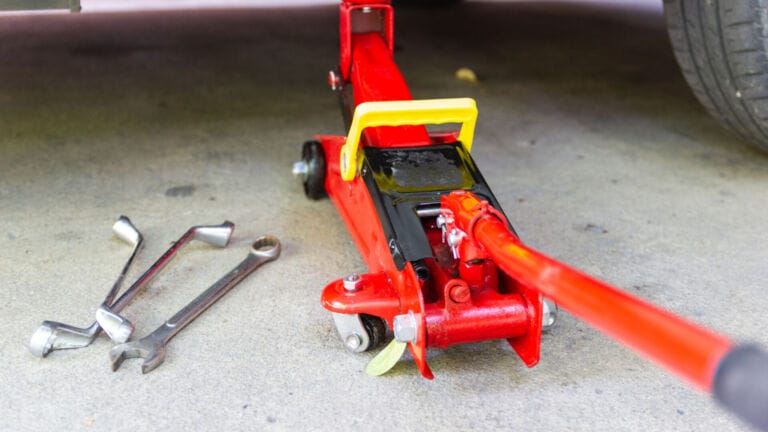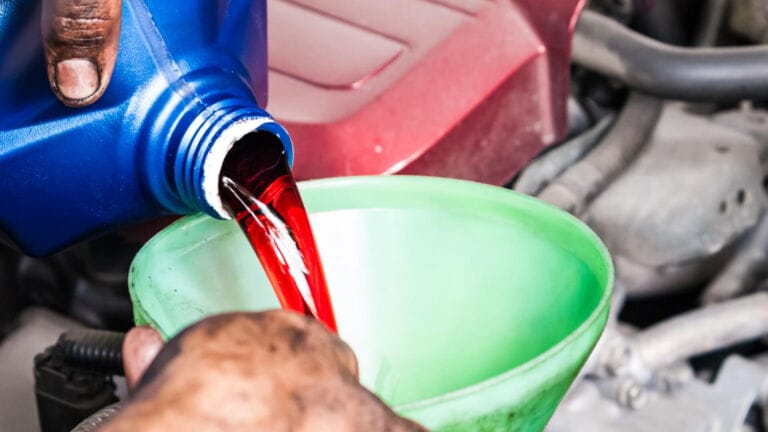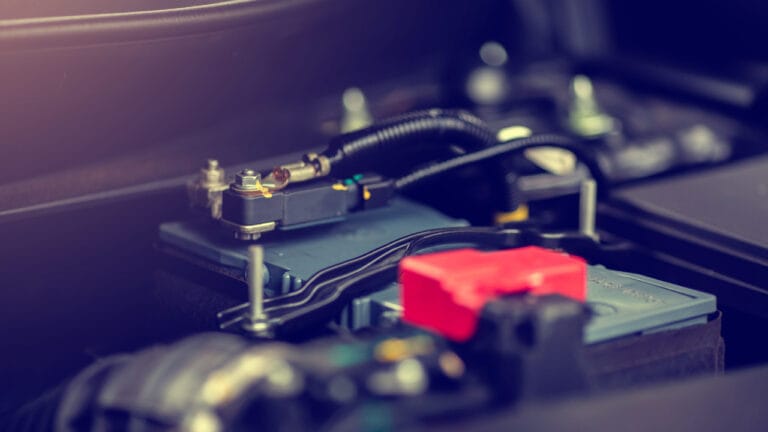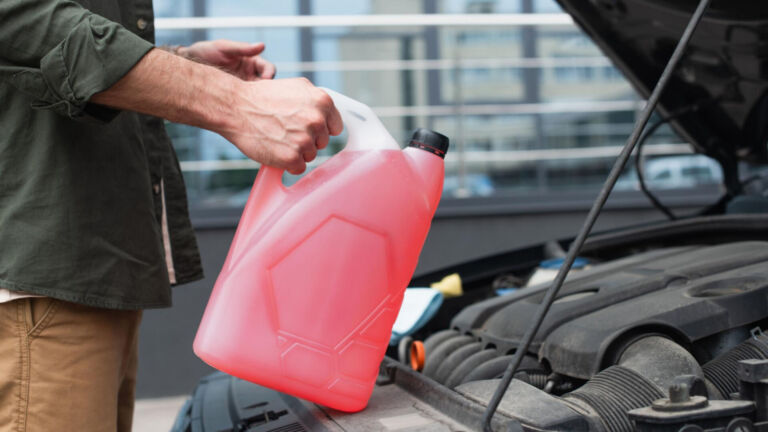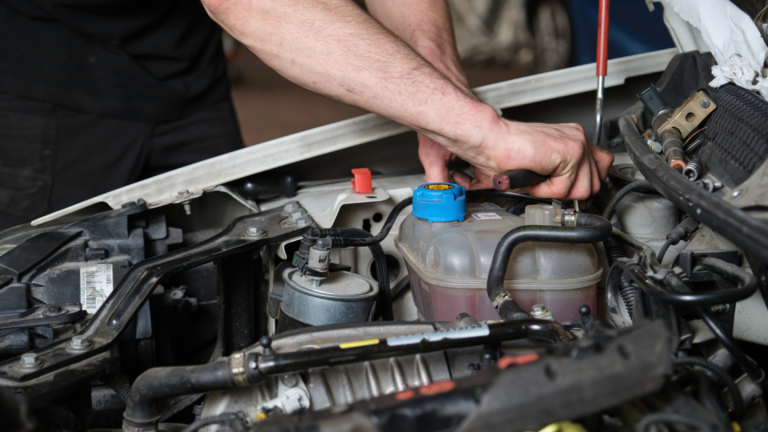Can You Use Carb Cleaner on Brake Rotors?
The debate rages on in the auto industry: can you use carb cleaner on brake rotors?
While some people swear by it as a cost-effective way of cleaning and maintaining their brakes, others say it’s a recipe for disaster. So what do you think about this?
Confused about which advice to pick? I am here to unfold the mystery.
The answer is a resounding “No.” Carb cleaner can be a potent solution for various automotive tasks, but its chemical composition, including lubricants, is not ideal for brake rotors.
So what will happen if you use it on brake rotors?
To know that you have scrolled down and be with me. In this blog, i will tell you everything you need to know about brake rotors and carb cleaners, with carb cleaner as our trusty sidekick.

From understanding the basics of each to differentiate between them and exploring the advantages and disadvantages of using carb cleaner on brake rotors. We’ll also discuss alternative options like brake cleaners.
And lastly, we will provide essential tips for brake maintenance to help ensure your vehicle remains safe and reliable while also saving you money in the long run.
- Understanding the Basics: Brake Rotors and Carb Cleaners
- The Debate: Can you use Carb Cleaner on Brake Rotors?
- When Should You Use a Carb Cleaner?
- Potential Risks of Using Carb Cleaner on Brake Rotors
- Safe Alternatives to Using Carb Cleaner on Brake Rotors
- Brake Cleaner VS Carb Cleaner
- How to Clean Brake Rotors With Carb Cleaner
- Brake Rotor Maintenance Tips
- My Experience with Carb Cleaner in Brake Rotors !!!
- Verdict:
Understanding the Basics: Brake Rotors and Carb Cleaners
Brake rotors and carb cleaners are the heroes of our article today. While the brake rotor is essential for stopping the vehicle, carb cleaners are used for cleaning carburetors and throttle bodies.
Before we dive into knowing details about using carb cleaner on brake rotors, it’s essential to understand brake rotor function and carb cleaner uses. This will help you to make an informed decision.
What are Brake Rotors?
Brake rotors, also known as brake discs, are vital components in the brake system.
This metal part is a flat, shiny disc you see through your car’s wheel spokes, which endure intense heat, friction, and tough deposits over time. Their significance goes far beyond their appearance.
When you engage the brakes, the friction between the brake pads and rotors is what ultimately stops your car. This process is what enables you to navigate safely through traffic, slow down to take a turn, or make a quick stop to avoid an obstacle. In essence, brake rotors are at the heart of your vehicle’s safety and control.
To ensure optimal performance, proper maintenance and cleaning of brake rotors are crucial. Choosing the right cleaning solution is essential to prevent damage.
What is a Carb Cleaner?
Now that we’ve grasped the details of brake rotors, let’s shift our focus to carb cleaner and how it fits into the automotive maintenance picture.
Carb cleaner, or carburetor cleaner, is a solvent-based specialized cleaning solution used to clean carburetors by removing stubborn varnish, grease, and contaminants. However, its ts impressive cleaning and degreasing properties make it go beyond just the carburetor.
Mechanics and car enthusiasts often employ it to clean and degrease other engine components, including fuel injectors, throttle bodies, and even spark plugs. But that doesn’t mean you can use it on the brake rotor, brake drums or other brake parts as well.
The Debate: Can you use Carb Cleaner on Brake Rotors?
Many people debate whether carb cleaner is suitable for cleaning brake rotors. While some believe it can effectively remove grime and debris, using carb cleaner on brake rotors can actually pose risks and potential damage.
And it’s true; using carb cleaner on brake rotors is a definite no-go. It contains grease that hampers friction, causing brakes to malfunction. It evaporates slowly, leaving behind an oily residue that can result in erratic braking, noise, and reduced stopping power.
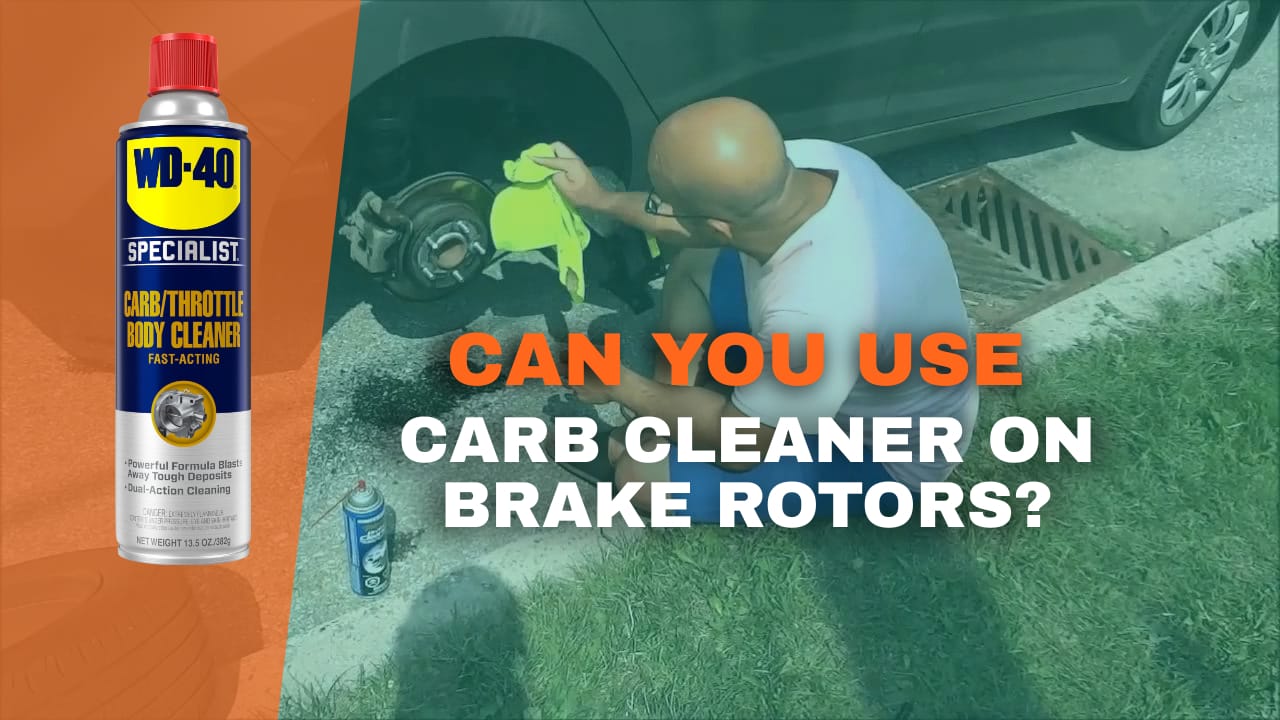
For something as critical as your brakes, precision is key, and carb cleaner’s lubricant properties only compound the problem. Picture trying to stop your car with slippery, greased-up brakes – not a pleasant thought, is it?
To make matters worse, carb cleaner contains harsh chemicals that may harm brake linings, potentially causing corrosion or damage. It’s like throwing a wrench into the finely tuned machinery of your brake system. When safety is at stake, it’s best to explore safer alternatives that also ensure your braking system’s reliability.
When Should You Use a Carb Cleaner?
While carb cleaner is not recommended for brake rotors, it still has its rightful place in automotive maintenance. It’s a workhorse in automotive care.
In general, carb cleaner is a potent degreaser. You can use it to clean and degrease various engine components, including parts that aren’t directly related to the carburetor or fuel system.
- Carburetor Cleaning: It lives up to its name by clearing varnish, gunk, and carbon deposits, enhancing engine performance.
- Throttle Body: Carb cleaner excels at as throttle body cleaner, removing carbon buildup for smooth operation.
- Fuel Injector Care: It dissolves injector deposits, enhancing fuel efficiency and combustion.
- Spark Plug Maintenance: Use it to clean spark plugs, promoting proper ignition for a smooth-running engine.
- Degreaser Extraordinaire: Carb cleaner is a powerful degreaser, tackling tough deposits and grime on various engine components.
Regular use of carb cleaner prevents clogs, boosts fuel system performance, and ensures efficient combustion. However, avoid using it on carburetor plastic floats, dashpots, painted surface, solenoids, and diaphragms, as it can dissolve these plastics.
Potential Risks of Using Carb Cleaner on Brake Rotors
Brake rotors are responsible for providing the friction necessary to slow down and stop your vehicle safely. It is made of a specific type of metal that requires special care and maintenance.
Using carb cleaners containing higher chemicals and lubrication properties can be a risky choice that can lead to decreased braking performance, increased stopping distances, and even brake failure in extreme cases.
Carb cleaner on brake rotors carries several significant risks:
- Interference with Friction: Carb cleaner contains substances that can leave behind an oily residue on the rotor’s surface. This residue interferes with the crucial friction needed for effective braking. When your brakes can’t grip as they should, it may result in unpredictable and inconsistent braking performance, potentially leading to accidents or near-miss situations.
- Reduced Stopping Power: With compromised friction, your vehicle’s ability to stop swiftly and effectively diminishes. The consequence is a longer stopping distance, potentially leading to hazardous situations, especially in emergency stops or sudden braking scenarios.
- Noise and Vibration: The presence of carb cleaner residue on the rotor can also cause undesirable noise and vibrations during braking. These unexpected sounds and sensations can be disconcerting and indicate compromised braking efficiency.
- Rotor Damage: Carb cleaner’s harsh chemicals can strip away the protective coating on the rotors and leave them vulnerable to corrosion and premature wear. Damaged rotors not only compromise safety but can also result in costly repairs or replacements.
- Brake System Contamination: The residue left by carb cleaners may find its way into other brake components, potentially affecting the brake pads, calipers, and brake fluid. Contaminated brake components can lead to a cascade of problems within the brake system and even brake failure.
- Voided Warranties: Using carb cleaner on your brake rotors can void your vehicle’s warranty, leading to potential out-of-pocket expenses for brake repairs and replacements.
Remember, when it comes to maintaining your brakes, safety should always be the top priority!
So, always use a brake-specific cleaner that is designed to remove dirt and debris without causing any harm to the rotor. This will ensure your brake rotors remain in optimal condition and continue to provide reliable braking performance when you need it most.
Safe Alternatives to Using Carb Cleaner on Brake Rotors
While carb cleaner is best avoided when it comes to brake rotor cleaning, there are safer and more effective alternatives designed specifically for this critical task. Obviously, Brake cleaner is the best option as it is formulated specifically for cleaning brake components; some more are also there. Let’s know about them.
Brake Cleaner
When it comes to cleaning brake rotors, the brake cleaner stands above the rest. This magical, nonaggressive hydrocarbon solvent is specifically designed to remove grease, oil, and other contaminants from your brake rotors, ensuring optimal performance and safety.
So why is brake cleaner the best? Well, for starters, it’s incredibly effective. With just a few sprays, brake cleaner can effortlessly dissolve and remove even the toughest grime, leaving your rotors sparkling clean. Not only does this improve braking performance, but it also extends the life of your brakes.
And let’s not forget about convenience – brake cleaner is easy to use and dries quickly so that you can get back on the road in no time.
Rubbing Alcohol
Rubbing alcohol, also known as isopropyl alcohol, is another go-to solution for safely cleaning brake rotors for many automotive enthusiasts.
And it’s no wonder why!
Well, let me tell you. It’s like the caped crusader of cleaning agents swooping in to save the day and restore your rotors to their shining glory. Its powerful cleaning properties make quick work of brake dust, grease, grime, and other contaminants, ensuring optimal performance and longevity of your braking system.
It’s like a little miracle worker in a bottle.
Plus, its high evaporation rate ensures that no residue or film is left behind, leaving your rotors clean and ready for optimal performance. And let’s not forget about its friendly demeanor and readily available. It is safe to use on most types of brake rotors and various surfaces without causing any damage or corrosion.
Turpentine
Turpentine is our next superstar. When it comes to keeping your brake rotors in top shape, turpentine is not only effective but also a responsible choice that you can feel good about using. It is a natural solvent that effectively dissolves grease and oil and breaks down brake dust and residue that can accumulate on the rotor surface.
Its high evaporation rate ensures that it leaves behind no residue or film, leaving your brake rotors spotless and ready for optimal performance. But what sets turpentine apart is its friendly nature—it’s non-toxic, biodegradable, and safe to use around pets and children.
Acetone
When it comes to cleaning brake rotors, acetone is a clear winner!
Not only does acetone get the job done effectively, but it also does so in an environmentally friendly way. It’s non-toxic and highly effective at removing grease, oil, and grime from rotors’ surfaces, including those made of steel or aluminum. It won’t cause corrosion, damage, or premature wear, ensuring the long-term durability of the braking system.
Its fast-drying nature means that you won’t have to wait around for hours for the rotors to dry before reassembling your brakes. Plus, it is readily available and cost-effective, making it a convenient choice for DIY enthusiasts and professional mechanics alike.
As well as cleaning brake rotors, acetone can also be used to clean other automotive parts and tools, making it versatile in the garage.
Mineral spirit
Mineral spirits, also known as Stoddard solvents, are petroleum-based solvents. It’s not so effective at cleaning brake fluid and grease, but it still proves quite effective in cleaning brake parts. You can say it’s another secret weapon for cleaning brake rotors.
It works by breaking down stubborn contaminants, allowing them to be easily wiped away. This makes the cleaning process quick and hassle-free.
Plus, mineral spirits have a pleasant smell that won’t leave you feeling overwhelmed during your maintenance tasks. Beyond its role in automotive maintenance, mineral spirits serve as versatile thinners for oil-based paints, varnishes, and certain stains.
So, if you want sparkling clean brake rotors that perform at their best, give mineral spirits a try – your brakes will thank you!
Homemade cleaner
When it comes to getting the best results with safety in mind and in a cost-effective way, nothing can beat homemade cleaner. It allows you to have full control over the ingredients and customize the formula that meets your specific needs.
You can easily create your own cleaning solution using common household items like vinegar, baking soda, dish soap, or lemon juice. They are safe, eco-friendly, and free of harsh chemicals. Not only will this give you peace of mind, but it will also protect you and the environment.
However, as the ingredients are available at home, this means you don’t have to spend a fortune on buying any extra ingredients; it’s cost-effective.
So why not give the eco-friendly and budget-friendly homemade cleaner a try?
It’s a win-win situation for both you and your brake rotors!
Brake Cleaner VS Carb Cleaner
Using the appropriate cleaner is essential for maintaining the safety and performance of your vehicle’s braking system. Let’s highlight brake cleaners’ specialized nature and the risks of using carb cleaners on brake components, particularly brake rotors.
| Brake Cleaner | Carb Cleaner |
| Contains acetone or isopropyl alcohol, safe for brake components. | Comprises a mix of chemicals and solvents, including lubricants, which can be detrimental to brake components |
| Chlorinated and non-chlorinated brake cleaners are available | Carb cleaners also come in chlorinated and non-chlorinated versions. |
| Effectively remove tough deposits, grease, and contaminants from brake rotors, ensuring optimal brake function | May not effectively remove brake residue, compromising brake efficiency and cause potential safety risks |
| Evaporate quickly, leaving no residue ensuring a clean surface. | Leaves behind stubborn varnish or residue, potentially compromising friction and performance. |
| Safe for all brake system parts, including rotors, brake pads, calipers, and brake lines. | Safe for cleaning carburetors, engine parts, and other automotive components, leaving the brake parts. |
| Widely available and cost-effective for regular brake maintenance. | It’s also affordable and widely available but not suitable for brake cleaning. It can lead to additional costs for repairs or replacements. |
How to Clean Brake Rotors With Carb Cleaner
As I told you, carb cleaner is not the best option for brake rotor cleaning, so I shared the potential risks to help you make the best decision. Now, still, if you want to give it a try, you must follow some safety precautions and the right cleaning procedure to be in a possible safe zone. Remember, the disadvantages of using carb cleaner as brake parts cleaner can never outweigh any of your excuses because safety is the first priority.
However, let’s know a step-by-step guide for cleaning brake rotors with carb cleaner.
- Choose a well-ventilated area to complete the brake cleaning task. The backyard is the best palace, but if it’s a garage, open all the doors and windows because adequate airflow is essential to prevent inhaling potentially harmful fumes.
- Now wear appropriate safety gear and Protective Clothing, including safety goggles to protect your eyes and gloves to shield your skin from contact with the lacquer thinner. It’s best to use old or disposable clothing, as carb cleaner may damage or stain fabric.
- As carb cleaner is flammable, keep the cleaning area well-defined and remove any flammable materials.
- Ensure the brake rotor is cool to the touch; spraying carb cleaner on hot parts can be hazardous.
- Now stand at a safe distance (usually 8-12 inches), hold the carb cleaner can, and apply short spray, controlled bursts.
- Avoid overusing the cleaner. It’s often better to apply carb cleaner to a cloth or soft brush and then clean the rotor. This minimizes overspray and helps control the application.
- After cleaning, inspect the component for any signs of damage or corrosion. If any issues are found, they should be addressed promptly.
- Carb cleaner on your skin or in your eyes is dangerous. If contact occurs, rinse immediately with copious amounts of water and seek medical attention if necessary.
Using the right cleaner will ensure the longevity and performance of your brake system while prioritizing safety on the road.
Brake Rotor Maintenance Tips
Maintaining your brake rotors is not just about ensuring your car stops when you want it to; it’s about safeguarding your safety and the safety of others on the road.
Brake rotor maintenance ensures that your brakes perform optimally, reducing the risk of accidents caused by delayed or inadequate braking. A well-maintained braking system, including the rotors, can be a lifesaver in emergency situations and a reliable companion during everyday drives.
- Smooth Braking: Try to avoid aggressive driving habits whenever possible. It involves sudden or excessive braking that can generate excessive heat, which can cause warping and premature wear on the rotors. Instead, try to anticipate stops and use gentle, gradual braking when appropriate. Additionally, be mindful of heavy loads or towing, as these activities can put extra strain on the rotors.
- Regular Inspection: Make it a habit to inspect your brake rotors periodically. Look for signs of wear, grooving, scoring, or discoloration. Any of these can be indicators of potential issues that should be addressed promptly and make necessary adjustments or replacements.
- Brake Pad Checks: Regularly check the thickness of your brake pads, If your brake pads are unevenly worn, it can cause excess friction on the rotors, leading to accelerated wear and potential damage. Replace them to prevent excessive wear on the rotors and ensure optimal braking performance.
- Cleanliness: Keep your brake rotors clean. Use a brake-specific cleaner or a safe alternative, as discussed earlier, to remove brake dust and contaminants regularly. Clean rotors allow for better friction and improved braking performance.
- Avoid Harsh Chemicals: As previously mentioned, avoid using harsh chemicals like carb cleaner on your brake rotors. These substances can lead to damage and reduced performance.
- Proper Torque Specs: When replacing brake rotors or working on the braking system, ensure that all bolts and components are tightened to the manufacturer’s recommended torque specifications. This helps maintain the integrity of the system.
- Brake Fluid Maintenance: Regularly check and maintain the brake fluid. Old or contaminated brake fluid can lead to brake component damage. Change the fluid according to your vehicle’s maintenance schedule.
- Use Quality Components: When replacing brake rotors, opt for high-quality OEM (Original Equipment Manufacturer) or reputable aftermarket rotors, and be sure to follow proper bedding-in procedures. This helps ensure proper mating between the two components and prevents premature wear.
- Balanced Wheels: Ensure that your vehicle’s wheels are balanced and aligned correctly. Wheel imbalances can lead to uneven rotor wear and reduced braking effectiveness.
If you notice unusual noises, vibrations, or reduced braking performance, consult a professional mechanic for a thorough inspection. Timely diagnosis and repairs can pay off in the long run, both in terms of performance and cost savings.
My Experience with Carb Cleaner in Brake Rotors !!!
While using carb cleaner on brake rotors is generally discouraged, I have attempted it and faced the consequences. In my beginning days with my first car, I had attempted to clean my brake rotors with carb cleaner, hearing it would be an efficient way to remove brake dust and grime from one of my cousins.
And it was true! It cleaned the brake rotor efficiently.
But I realized a reduction in braking performance a few days later. The brakes became noisy, and there was a noticeable delay in stopping the vehicle. Concerned about safety, I took the car to a professional mechanic; he inspected the brake rotors, and guess what he found?
Residue from the carb cleaner had interfered with the friction between the brake pads and the rotors. This led to reduced stopping power and noise.
The mechanic strictly advised against using carb cleaner on brake rotors and shared his knowledge of how important it was to use the right cleaner to maintain the integrity of the braking system.
Verdict:
Many people mistakenly use carb cleaner on brake rotors, which can lead to dangerous and potentially life-threatening consequences.
Imagine the frustration of having to replace your brake rotors because they were damaged by using the wrong product. Not only would you have to spend time and money on repairs, but you could also be putting yourself and others at risk by driving with compromised brakes.
So, always prioritize safety and try to use the right tools and cleaning solutions, such as brake-specific cleaners or alternative safe solvents, to ensure your brake rotors stay in top shape and operate efficiently.
Happy driving!

